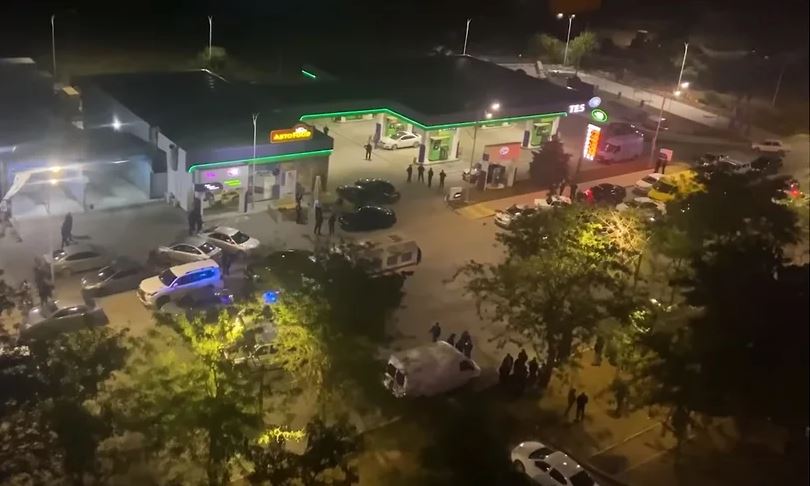Dozens of individuals were detained after clashes in Yevpatoria, in Russian-occupied Ukrainian Crimea, on the night of September 22, 2021. Police fired shots into the air to stop the rioters and arrested 58 people as a result of the disturbances. Law enforcement reportedly found small arms on some of the detained individuals (Interfax, September 22). One resident of Crimea was diagnosed with heavy injuries after being beaten up by a group of Chechens. The authorities avoided calling out the ethnic identities of the detained individuals but launched a criminal investigation against a 31-year-old man who reportedly arrived in Crimea from the North Caucasus. Among others, Murad Saidov, the assistant to the representative of the governor of the Chechen Republic in the Republic of Crimea, was summoned to the police station in the Crimean town of Saki. The news agency’s sources alleged that Saidov arrived at the station in a black Mercedes and defiantly left it parked in the middle of a crosswalk. According to news coverage, Saidov also ended up arrested (Podyom, September 24).
Soon after the event, further information emerged that the clashes had involved antagonistic groups of Chechens and Crimean Tatars. Their conflict started with a trivial incident at a local gas station, where several Chechens apparently vandalized a coffee machine and attacked the security guard on duty for rebuking them. Crimean Tatars rose in defense of the badly beaten man, while the Chechens temporarily retreated. The conflicting sides agreed to reconvene to talk the incident over. But according to news sources, the local Crimean Tatars arrived at the meeting armed with sticks, rods, screwdrivers and eight traumatic guns. The Chechens showed up numbering about 30 people, and as soon as violence broke out, riot police (OMON) showed up. According to a press source, the Chechens came unarmed but summoned OMON. Hence, the police primarily detained Crimean Tatars, while the Chechens walked free (Podyom, September 22).
Although the clashes in Yevpatoria look like a random event, some news outlets reported that the conflict may be directly related to the owner of the business, the former director of the state enterprise Chernomorneftegaz Sergei Beim. Last summer, the Arbitration Court of Moscow District dismissed a cassation appeal by Beim’s company, upholding the decision of the Kyiv Commercial Court to recover the debt of one billion rubles (about $14 million) to PJSC OTP Bank of Ukraine. Later, Beim was involved in a fatal traffic accident near the village of Pribrezhny, Saki District of Crimea, which resulted in the death of an elderly woman and multiple injuries to an 11-year-old child. The businessman avoided a criminal case after concluding a settlement agreement with the injured party, paying them more than 17 million rubles (about $230,000) in compensation. Some observers say that the weakened Beim became the target of a competing business that is trying to either racket him or take over his remaining businesses using Chechens (Kommersant, September 22).
Trending Now
Chechens have recently been involved in a number of other incidents on the peninsula—a phenomenon that is becoming a trend in annexed Crimea. In the fall of 2020, a Chechen tourist killed a local man in Simferopol. In July 2021, a mass fistfight between locals and Chechen tourists took place in downtown Simferopol. The Kremlin’s spokesperson, Dmitry Peskov, reacted to the incident at the time saying, “In any case, it does not matter whether they are Caucasians or not, they are all citizens of our country; and if one of the citizens is disobeying the representatives of law enforcement agencies,” he or she should be prosecuted according to the existing legislation (Gazeta.ru, July 30). Earlier, in February 2019, Murad Saidov, an assistant to the representative of the governor of the Chechen Republic in the Republic of Crimea, was arrested. The police found Saidov among more than a dozen armed men who beat up Ibragim Aliyev, a local businessman of Chechen origin. The assailants reportedly tried to make Aliyev sign away a part of his business to Saidov. Chechen head Ramzan Kadyrov defended Saidov, saying that the handgun police found on his person was completely legal. According to Chechnya’s governor, the two men, Saidov and Aliyev, had known each other for years and had been arguing over business matters, which they would settle “in strict compliance with the law” (Kommersant, February 7, 2019).
Chechens currently comprise a tiny fraction of Crimea’s population. The interim Russian census of the peninsula, carried out within months of the annexation, in the fall of 2014, indicated only a little over 200 Chechens living there. The Crimean Tatar population, in contrast, was estimated at over 230,000, or about 10 percent of the population of Crimea (Gks.ru, accessed September 27, 2021).
Read More:
- “After they electrocuted me, I told them everything they needed.” How Russia’s FSB extracted a “confession” from a Crimean Tatar
- How Crimean Tatar leader Dzhelyal swelled the ranks of Ukrainian “saboteurs”
- Ukrainians’ hope in returning Crimea wane, yet support for Crimean Tatar autonomy grows
- Entire spectrum of Russian propaganda increasingly aggressive in its messaging, Kirillova says
- Russian elections in Ukraine’s Donbas: Annexing people before annexing territory
- Hundreds of victims of war criminals in Russian-occupied Donbas await justice. Here is what can help them
- Russia shuttles residents of occupied Donbas to vote in Duma elections amid accelerated passportization
- Ukrainian Foreign Minister reminded his Russian counterpart what Russia was called until the 18th century

